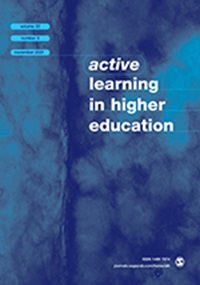A higher degree of resilience: Using psychometric testing to reveal the benefits of university internship placements
IF 3.2
1区 教育学
Q1 EDUCATION & EDUCATIONAL RESEARCH
引用次数: 5
Abstract
Resilience is a multifaceted concept but, in the context of learning, it can best be thought of as an individual’s capacity to create and maximise opportunities as well as responding positively to setbacks and challenges. Developing students’ resilience is becoming increasingly important. Research has shown resilience links to attainment, retention, engagement and employability. However, very little work has examined what aspects of curricula enhance resilience and the particular role of active learning frameworks in achieving this. In this study, we analyse the effects of optional real-world internship placements on eight measures of resilience. Psychometric testing was conducted twice per student – at the start of their second academic year and again at the end. Students choosing an internship had significantly higher challenge orientation and adaptability scores than other students in the same cohort. Adaptability of both interns and non-interns improved over the academic year, but improvement was significantly higher for interns. Scores for optimism, purposeful direction and ingenuity significantly increased between start-of-year and end-of-year tests for interns versus a decline for non-interns. We conclude that facilitating student engagement with real-world issues and challenges through supported internships within an active learning framework is an important mechanism for increasing students’ resilience.更高程度的恢复力:使用心理测量测试来揭示大学实习安排的好处
韧性是一个多方面的概念,但在学习的背景下,它最好被认为是个人创造和最大限度地利用机会以及积极应对挫折和挑战的能力。培养学生的应变能力变得越来越重要。研究表明,复原力与成就、保留、参与和就业能力有关。然而,很少有工作研究课程的哪些方面可以增强韧性,以及积极的学习框架在实现这一点方面的特殊作用。在这项研究中,我们分析了可选的现实世界实习安排对八项弹性指标的影响。每个学生进行两次心理测量测试——在第二学年开始时和结束时。选择实习的学生的挑战定向和适应性得分明显高于同一队列中的其他学生。实习生和非实习生的适应性在本学年都有所提高,但实习生的适应性提高幅度明显更大。在年初和年底的测试中,实习生的乐观、有目的的指导和独创性得分显著提高,而非实习生的得分则有所下降。我们得出的结论是,在积极的学习框架内,通过支持实习,促进学生参与现实世界的问题和挑战,是提高学生应变能力的重要机制。
本文章由计算机程序翻译,如有差异,请以英文原文为准。
求助全文
约1分钟内获得全文
求助全文
来源期刊

Active Learning in Higher Education
EDUCATION & EDUCATIONAL RESEARCH-
CiteScore
13.20
自引率
12.00%
发文量
31
期刊介绍:
Active Learning in Higher Education is an international, refereed publication for all those who teach and support learning in higher education (HE) and those who undertake or use research into effective learning, teaching and assessment in universities and colleges. The journal is devoted to publishing accounts of research covering all aspects of learning and teaching concerning adults in higher education. Non-discipline specific and non-context/country specific in nature, it comprises accounts of research across all areas of the curriculum; accounts which are relevant to faculty and others involved in learning and teaching in all disciplines, in all countries.
 求助内容:
求助内容: 应助结果提醒方式:
应助结果提醒方式:


